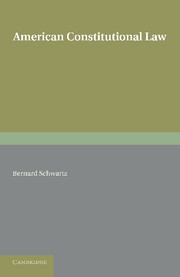Book contents
- Frontmatter
- Dedication
- Contents
- Foreword
- Preface
- PART I THE STRUCTURE
- PART II MODERN DEVELOPMENTS
- Chapter VI The New Federalism
- Chapter VII Presidential Prerogative and the Steel Seizure Case
- Chapter VIII The Changing Role of the Supreme Court
- Chapter IX The Negro and the Law
- Chapter X Civil Liberties and the 'Cold War
- Chapter XI Administrative Law
- Chapter XII The United States and the United Nations
- Appendix: Constitution of the United States of America
- Index of Cases
- General Index
Chapter XI - Administrative Law
from PART II - MODERN DEVELOPMENTS
Published online by Cambridge University Press: 05 June 2016
- Frontmatter
- Dedication
- Contents
- Foreword
- Preface
- PART I THE STRUCTURE
- PART II MODERN DEVELOPMENTS
- Chapter VI The New Federalism
- Chapter VII Presidential Prerogative and the Steel Seizure Case
- Chapter VIII The Changing Role of the Supreme Court
- Chapter IX The Negro and the Law
- Chapter X Civil Liberties and the 'Cold War
- Chapter XI Administrative Law
- Chapter XII The United States and the United Nations
- Appendix: Constitution of the United States of America
- Index of Cases
- General Index
Summary
If it were written some fifty years ago, a work like the present one, seeking to explain the essentials of American constitutional law to a British audience, would hardly have included a chapter devoted to administrative law. The British jurist could not be expected to show an interest in developments abroad in a field whose existence he had been accustomed to deny at home. If, however, a half-century ago it required the ‘prophetic sense of a Maitland’ to realize the great growth of administrative law, today awareness of that growth has become a commonplace. Administrative law, as a leading American judge has recently affirmed, is now recognized as ‘the outstanding legal development of the twentieth century, reflecting in the law the hegemony of the executive arm of the government’. Nor, it should be noted, is the realization of this confined to members of the legal profession. Indeed, as significant to the student of administrative law as the tremendous extension of his subject, has been the widespread public interest displayed in it in recent years.
Public concern over trends in this field reflects an increasing awareness of its importance in dealing with the many problems arising out of the expansion of the role of the State. Human existence is inconceivable outside of society. At the same time organized society threatens to overwhelm the individual. ‘There is not a moment of his existence where modern man does not find himself in contact with government and its agents.’ In the contemporary State, government tends more and more to become the all-dominant factor in society, by taking over or controlling the functions hitherto performed by private institutions. As it does so it comes into ever-increasing contact with the individual life. ‘It is in this ceaseless contact of the individual with the State that the danger of arbitrariness has especially arisen.’
- Type
- Chapter
- Information
- American Constitutional Law , pp. 283 - 307Publisher: Cambridge University PressPrint publication year: 2013
- 1
- Cited by

